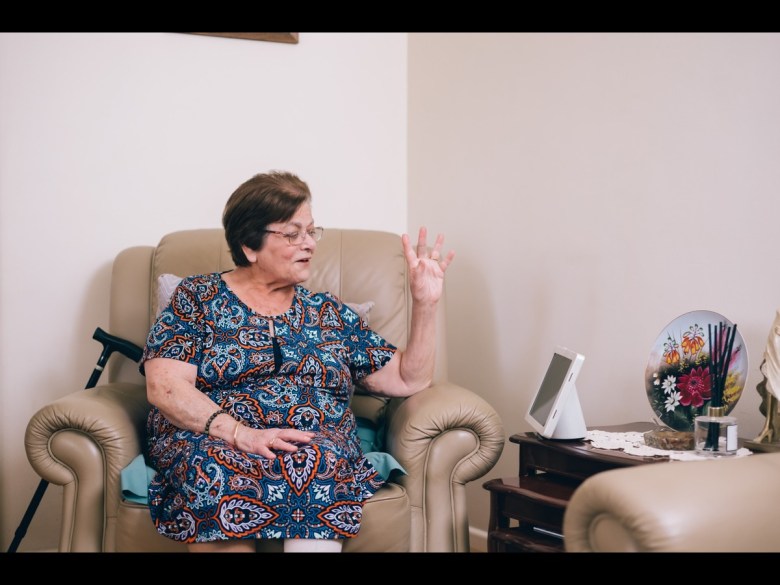A dementia diagnosis can cause anxiety and worry, but an Australian invention hopes to make communication easier for families and those with the disease.
It’s called CareWindow.
The company was inspired by founder and CEO Zac Bailey’s dad, who developed early onset dementia following a series of stroke-like episodes after a course of radiotherapy. The episodes left him unable to walk or use his electronic devices.
Bailey’s dad experienced physical and vocal symptoms that made it difficult for him to execute the movements or voice control needed to use the devices.
“Despite him being pretty clever with technology beforehand, he would struggle to get it right [after the episodes],” Bailey said.
This made it harder for him to keep in touch with his family, and Bailey said they went in search of something to make calling his father easier.
“We experimented with things like tablets and… changing some settings around on my phone, but nothing really worked well for him,” he recalled.
Bailey and his sister put their heads together to come up with a solution. Bailey is an engineer by trade, while his sister is an ICU nurse who has worked in aged care.
Three prototypes later, they had “arrived at something that was really quite useful”, Bailey said.
What is CareWindow?
CareWindow is a video phone with a few extra features that make it easy for people with dementia and disability to use.
This includes a camera that sits on top of the device and can be closed with a whole hand; rounded edges for safety; a plastic rather than glass front to avoid shattering if the device is dropped; and rubber strips for stability.
It has a ringtone like a regular phone, large buttons and the screen flashes to get the attention of people who are Deaf or Hard of Hearing.
It can also be controlled on the family member’s end when needed, for example to lock out functions so the user can’t accidentally unlink themselves from a family group.
It underwent multiple tweaks before being launched, and behind the scenes the team worked with a researcher from Flinders University and many aged-care staff to get an understanding of what people with dementia need from a communication device.
Care Window was finally hard launched in March 2024, with more than 500 units sold mostly to the families of people with dementia.
Bailey said family members often notice their loved ones slowing down or stumbling, and want to give them something to maintain their independence.
He said this is especially important if a person is living in aged care, where workers only have limited time to assist them in using a phone.
“Where Care Window steps in for those families is they purchase our unit, set it up by the bedside or in the loungeroom… and within five minutes of having it set up, they can call one another with a very high success rate,” he said.
He added CareWindow can also be used by people with disability, with around one fifth of the device’s clients on the NDIS.
An early supporter of the CareWindow was the Cerebral Palsy Alliance, which provided funding for the device’s development through the accelerator program Remarkable.
Bailey said Remarkable helped get CareWIndow get off the ground and clarify what it offered and how it could help the community.
“It came along at the right time, when we were really happy with the prototype unit, and we’d sold a small number of pre-rders.”
Remarkable helped the company develop its messaging to get CareWIndow out to more people, and provided mentorship for the sales and marketing team.
With word spreading about CareWindow, Bailey is looking forward to seeing where this company – which all began as a way to help people like his dad – can continue to grow.
They are currently looking at home care providers, supported independent living homes, and various NDIS providers.
“We’re really trying to become a bit of a household name,” he said.
He’s been buoyed by “overwhelmingly positive” feedback from users of CareWindow.
“I think because it solves such an important need for people. It’s giving people the ability to have those connections they didn’t have prior. It’s peace of mind, but it’s more than peace of mind – it’s keeping family units working together,” he said.

